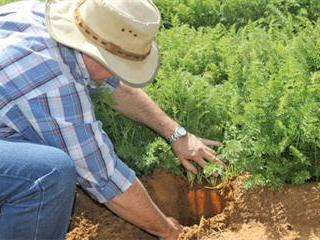
The fundamental principle of the Farming for the Future programme (FFF) is to work with nature, not against it. This means combining the best of conventional farming methods with organic practices to improve soil health, reduce inputs and increase yields.
FFF technical manager, Kobus Pienaar, explains that the programme is not about ‘going organic’, but rather about decreasing farming’s impact on the environment. The Greenpak farm in Bothaville, owned by the Liebenberg family, has 600ha of irrigated lands on which butternuts, carrots and pumpkins are cultivated. About 150ha is under carrots, divided into 24 lands of x 6,25ha each.
Greenpak also has a processing facility where the carrots are cleaned, graded and packaged. According to Kobus, Woolworths measures the impact of Greenpak’s cultivation based on the premise that carrot farming should theoretically have no impact on the environment at all. Since embarking on the FFF programme in 2008, Greenpak has gone from a 52% score to a 74% score on this environmental impact scale, which means that it currently has a negative impact of only 26%. The average score for vegetable farmers in this regard is about 68%.
Kobus explains that during the first two years of conforming to the FFF system, he had to invest in inputs. Thereafter, his operation became increasingly profitable as the entire farming operation benefited from these improved practices. Wastage on the farm is between 5% and 6% of production, which compares well with international norms, according to Kobus.

From left: Attie Grobler, (Greenpak farm manager), Kobus Pienaar (FFF technical manager), and Toks Liebenberg (part-owner of Greenpak). One of the biggest obstacles faced by the Greenpak team is the threat of too much rain, which can result in the carrots being washed away.
“Woolworths’ customers expect top quality. For this reason, we address any problems on the land to ensure that the carrots can grow under optimal conditions to conform to our standards. If we fix the problems on the land, we have less wastage come harvest time,” he explains. The FFF programme is based on meticulous measurement.
“Nothing is thumb-sucked,” says Kobus. “Farming has become highly scientific and independent consultants give us advice on inputs. As they don’t sell any products, they’re not biased.”
Carrot cultivation
Greenpak follows a crop rotation programme in which carrots are planted for one year, followed by Eragrostis curvula for the next three years. According to Toks Liebenberg (part-owner of Greenpak) the grass has two advantages: it improves the quality of the soil and helps to eliminate nematodes from the soil, as it is not a host for them. Planting density is also carefully managed to ensure optimal carrot size and yield.
Seed is sown at a density of one million seeds/ ha for an in-row stand of about 850 000 carrot plants/ha. The Greenpak team grows carrots year-round, using frost netting in winter. The netting helps retain soil moisture, shortens the growing cycle and prevents the carrots from becoming woody, as would be the case if they remained in the soil too long in cold weather.
The planting-to-harvest cycle ranges from 110 days in summer to 150 days in winter and the yield can vary from 60t/ha to 100t/ha, depending on the season. Toks explains that since they implemented the FFF programme, the carrot crop’s pack out percentage has increased. “We now have more carrots of a high standard than before, which means more end up on Woolworths’ shelves. We can now also plant less seed to get the same carrot crop.”
Preciosion farming
One of the key achievements at Greenpak has been to develop healthier soil on the lands. According to Kobus and Greenpak farm manager Attie Grobler, this has resulted in healthier plants that require less fertiliser and also less herbicide and pesticide. Precision farming also helped reduce the farm’s fertiliser requirements.
Before a land is planted, detailed soil analysis is undertaken to show which elements are needed. The information is entered on a map which is then programmed into the fertiliser applicator so that fertiliser can be applied according to these specific needs. Fertiliser is sprayed onto the carrots according to the results of leaf analysis. This is followed by irrigation four hours later. The carrots are fertilised once a week in summer and fortnightly in winter.
Toks says the biggest challenge they face on the farm is too much rain because the carrots can wash away. “Each new centre pivot land is measured by a land surveyor, who recommends the degree at which the land should be levelled,” he explains. “A contractor then levels the land using a laser and on average more than 1 000t of soil per hectare is redistributed. Next, the surveyor recommends the planting direction, which should be as close to an average angle of 0,4% as possible.
“The GPS system on the tractor determines the direction in which it should be working. If the angle is too steep, water runs off too quickly and we get erosion damage. If it’s not sufficient, run-off is too slow and the land becomes waterlogged.” Since this approach has been used at Greenpak, the carrots have never rotted in the soil, claims Toks.
Precision water management
One of the objectives of the FFF programme is to reduce water usage on farms. The Liebenbergs have installed an irrigation system from DFM Software Solutions that ensures that only the carrots’ root zone remains wet. The extensive network of probes measures soil moisture every hour and activates irrigation only when necessary.
“We don’t irrigate more than we have to,” explains Toks. “If we irrigate too much, it ‘drowns’ the roots and water is wasted. The soil is also leached and the fertiliser goes to waste.” Since installing the system, Greenpak’s irrigation water usage has fallen by 20%. The irrigation programme is linked to Attie’s cellphone. He can then decide when and how much to irrigate via cellphone. “With this system, we can also see under which circumstances carrots need more or less water,” he explains.
Optimal irrigation
Optimal irrigation has many benefits. “We save electricity and the soil does not become compacted from all the surplus water. Diseases such as Sclerotinia rot is also reduced as there are no puddles of water.” Careful water management also ensures that the packhouse uses water efficiently. Usage is measured electronically and workers are trained to avoid spillages and limit wastage. A carrot shaker removes excess soil before washing.
The packhouse also uses environmentally-friendly cleaning agents and disinfectants, and is phasing out all chemicals containing sodium and acids that increase the chemical-oxygen demand on the water. The wastewater treatment system has been adapted to prevent contaminated water from being returned to the environment, and all wastewater goes to an on-site treatment plant where the solids are separated out.The remaining water is then redirected to the farm where it is used for irrigation.
Email Kobus Pienaar at [email protected].













